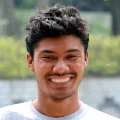Study at the University of Cambridge
Cambridge, United Kingdom


| Programme details | |
|---|---|
| Degree: | Master of Philosophy (MPhil) |
| Disciplines: |
Anthropology
International Development Gender Studies |
| Duration: | 11 months |
| Study modes: | full-time |
| Delivery modes: | on-campus |
| University website: | Social Anthropology |
Request information from the University of Cambridge
The Cambridge MPhil by advanced study in Social Anthropology is an intensive 11-month course (early October to end August).
The course is intended for graduate students who are studying the subject for the first time, who have studied Anthropology in the context of a more general degree, and/or for those with little knowledge of the tradition of British Social Anthropology.
The degree can be a free-standing qualification or a route to the original research involved in a PhD, or a means to acquire knowledge of anthropology for use in other fields and professional contexts.
This is a demanding course which enables students to reach a fairly high level of specialist knowledge in social anthropology within a relatively short time and, subject to performance in their exams and assessed work, equips them to undertake a research degree. Given that MPhil students are supervised on an individual basis in order to provide a programme of teaching tailored to individual needs, the assignment of supervisors is spread as evenly as possible among the staff attached to the Department.
Principal fields of anthropological analysis are covered in two core seminar courses in 'The Scope of Social Anthropology'. Attendance at these is compulsory for all students. These two courses cover, respectively, 'Production and Reproduction', which includes the fields of economic anthropology and kinship studies; and 'Systems of Power and Knowledge', which includes political anthropology and the anthropology of religion.
Students also take a non-assessed course in theory and methods and one course in a specialist option subject. Different optional papers are on offer each year. Examples of optional papers include : Ethnography; Gender, Kinship and Care; History, Archive, Time. In addition, for those wishing to specialise in a particular professional field, the Department may also offer options in Social Anthropology and Museums and Medical Anthropology. A provisional list of planned modules can be found on the Department's website.
Knowledge and understanding
The course addresses key problems in anthropological theory, interpretation, comparison and analysis in relation to particular ethnographies and substantive debates in the anthropological literature. Through critical reflection on a range of anthropological theories, and through practice in the application of those theories to bodies of ethnographic material, students acquire a thorough and intensive grounding in a range of styles of social anthropological analysis.
Practical and transferable skills
The General course offers training in the following transferable skills:
Students are also encouraged to use the range of training and developmental opportunities available across the University, including training on research methods through Cambridge Research Methods, careers advice through the Cambridge University Careers Service and language learning through the Language Centre, including Academic English.
Museum Option students are expected to:
Medical Anthropology Option students are expected to:
Continuation to the PhD is usually subject to the following:
Applicants intending to continue to the PhD programme should state so in their statement of purpose, as well as making a separate application to the PhD course within the application period; continuation is not automatic and those wishing to continue must make a full application. Acceptance for the MPhil does not guarantee that you will be accepted for continuation to the PhD course.



Visit the website of the University of Cambridge to find out how to apply and start your study-abroad adventure in the United Kingdom! 🙌